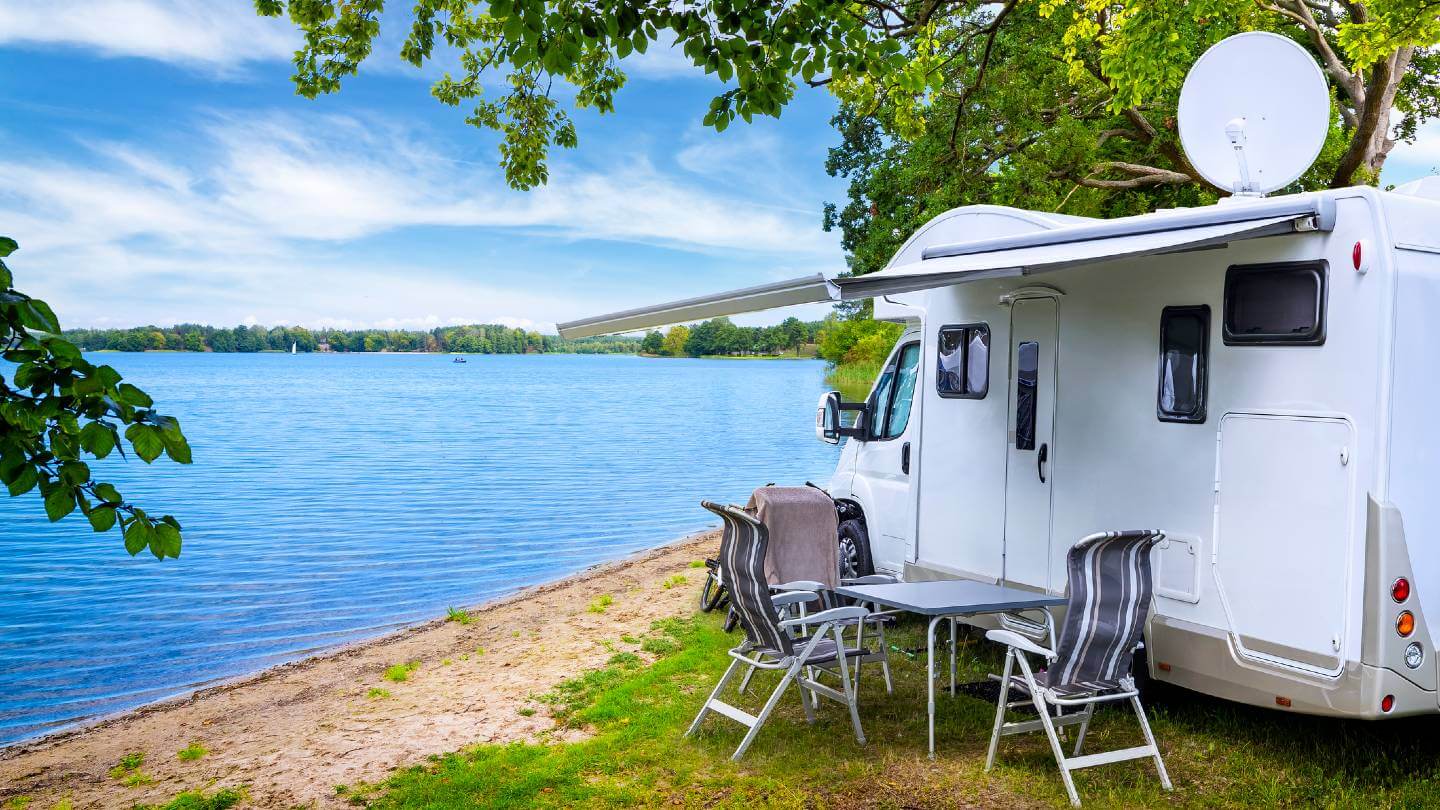[ad_1]
Whether you’re planning the great cross-country trip you’ve always dreamed of, or hoping to live a more mobile lifestyle, there are ways to bring recreational vehicles into the 21st century so you can go off the grid while still staying connected.
RV ownership has increased by 62% in the last 20 years, and over 11.2 million American households own an RV. RVs are no longer just recreational; they are mobile homes and offices with an abundant choice of views.
But what about RV internet? How is it possible to have good enough internet to work if you’re constantly on the move? Are there insider tips on getting good RV Wi-Fi? We’ve got you covered! Here you’ll find the details on how to make sure your RV internet setup is solid whether you decide satellite, wireless or public Wi-Fi is right for you.
Before you start living on the road, there are a few options to consider so you can find the best internet solution for you.
RV satellite internet
If you plan to make an RV your new home, you may want to consider setting up a satellite internet connection. This is a more permanent solution, though, and it would be best if you plan to park your RV in one place for a long time — not if you’re driving around regularly.
Unlike cellular data that relies on nearby cell phone towers, it’s a great connection type for hard-to-reach or rural areas since your signal comes from satellites above.
Starlink
Starlink offers a pay-as-you-go plan for travelers for $150/mo, with a one-time hardware fee of $599. It’s easy to pause service when you get back home, too. Everything is provided to you to easily set up your RV service, you just need a clear view of the sky. Starlink also has Starlink ‘Mobility’, which allows for up to 220 Mbps high-speed internet while you’re in motion. These plans start at $250/mo. But come with a hefty hardware fee of $2,500. Check out Starlink’s availability and coverage map.
Viasat and HughesNet
Two major satellite providers in the U.S. are Viasat and HughesNet. Both providers are available in every state. Viasat and HughesNet both offer data plans that won’t cut you off after you reach your limit but will sometimes throttle your speeds.
Why we like satellite
-
Availability: HughesNet and Viasat are available anywhere; Starlink is growing
-
Data: Starlink has unlimited data; HughesNet and Viasat won’t cut off your service for going over your cap, but may throttle speeds a bit.
Things to consider
-
Fixed space required: You must be in a stopped position to access the satellites, so surfing or streaming isn’t available while you are moving
-
Contracts: HughesNet and Viasat require a 2-year agreement; Starlink has a pay-as-you-go feature for travelers
Free Wi-Fi hotspots
Perhaps the easiest — and cheapest — way to get an internet connection while traveling in an RV is to rely on free Wi-Fi hotspots. This solution is probably best for anyone who’s traveling for a shorter time, not necessarily using their RV or van as their home since it’s not a reliable connection.
In cases where your provider may not have a Wi-Fi network, you can take advantage of free hotspots in larger cities as well as some campgrounds. For instance, in Seattle, attractions like the Space Needle and coffee shops like Starbucks offer free Wi-Fi. The obvious downside here is that you’ll need to be in a specific location to take advantage of these internet connections. Also remember, public networks can also be dangerous.
Some RV campgrounds offer a Wi-Fi connection in the park to provide free internet for campers. But depending on the campground size and your location within it, you may need a Wi-Fi extender to get the speed you need. If you’re relying on RV internet from the campground but also a mobile hotspot for backup, you may also need a cellular booster to help amplify your cell signal and, therefore, improve your camping Wi-Fi signal.
What we like about free hotspots
-
Cost: Free!
-
Availability: You can find a free hotspot in almost any cafe or library.
Things to consider
-
Safety: Public internet access can be risky
-
Location: You must be in a specific place to access it.
Paid Wi-Fi hotspots
If you have internet at home and are traveling for a few weeks or months in an RV, then you may be able to take advantage of your internet service provider’s hotspot network. Providers like Spectrum and Xfinity offer thousands to millions of Wi-Fi hotspots all across the country.
You can often turn your phone into a mobile hotspot or purchase a portable mobile hotspot to take your connection with you on your travels. AT&T, Sprint, T-Mobile and Verizon offer both cellular data and mobile hotspot plans.
AT&T
AT&T has prepaid mobile hotspot and tablet plans available that work if you are in a serviceable area. The plans range from 20 GB of data for $25/mo. to 100 GB for $90/mo.
AT&T’s In-Car Wi-FI Data Plans start at $25/mo. They also offer six-month and annual plans and a 30-day plan to ensure coverage while you’re on a car trip. See if your vehicle is covered here.
Verizon
Verizon is a popular option for travelers and in 2021, they introduced more travel-friendly options for hot-spot users. The plans range from $20 for 15 GB to $80 for 150GB of data. You just need to be in a Verizon-serviceable area to use your data.
T-Mobile
T-Mobile has hotspot mobile internet plans that include unlimited texting and data, starting at $10/mo.
What we like about paid hotspots
-
Mobile: It’s always with you
-
Data: If you have an unlimited plan, you don’t need to track usage
Things to consider
-
Availability: Some areas you travel to may not be covered
-
Data: If you don’t have an unlimited plan, overage costs can be pricey
Cellular internet
As the need for strong internet options on the road grows, so are the options. With your mobile plan, consider adding a cellular router with a modem for your advanced needs like video conferencing, gaming and more. RVLove.com recommends a cellular router for great connectivity while living in an RV. Of course, you’ll need a suitable mobile plan to support your needs.
Nomad
Nomad Internet removes the need for mobile hot-spotting with one carrier by providing cellular internet from available carriers. For traveling nomads, this can be a great option for RV internet service. Nomad’s prices start at $89.00/mo., but you can enjoy unlimited data for $129.00/mo.
Why we like cellular options
-
Availability: Nomad can keep you connected almost anywhere by accessing service from many major providers
Things to consider
-
Price: Can be expensive

Image credit: Amazon
What’s the easiest option for RV internet?
When leading the nomadic lifestyle, using your cellphone to connect online is the easiest option, but be wary of the possible charges and, of course, service from your carrier needs to be in the area you are traveling.
Do some preplanning before you turn on your cellphone’s mobile hotspot and connect your laptop or tablet when away from home. Remember, most major cell companies have an add-on mobile hotspot plan, some as low as $5/mo., so it is worth looking into if you’re going to be on the road more than in your home office.
While going off the grid and disconnecting feels good, sometimes you may want to chat with friends and family or post to Instagram while on the road. Consider these options for staying connected while traveling in an RV during your next outing!
RV Wi-Fi FAQs
RV internet can be one service or a combination of them, including satellite, mobile hotspot or free public or paid Wi-Fi.
How much does RV internet cost?
The cost for your RV internet will depend on a variety of factors including which service you use, your location and whether or not you’ll need a Wi-Fi extender or a cell booster. In some cases, you may be able to take advantage of free internet through free public hotspots.
What’s the best internet for RV’s?
The best internet for RV life depends on what you need internet for and what your RV lifestyle is like. Many people use a combination or internet options to ensure they are connected no matter where their RV takes them.
Allconnect: Let us compare providers for you
Why should you choose Allconnect? We’re the #1 broadband marketplace in the U.S, meaning you can trust us to search, compare and order internet and TV service for your home.


Written by:
Camryn SmithAssociate Writer
Camryn Smith is an Associate Writer with Allconnect.com. She specializes in writing about the broadband industry and helping consumers navigate complex internet service purchasing decisions…. Read more
Edited by:
Robin LaytonEditor, Broadband Content
[ad_2]
